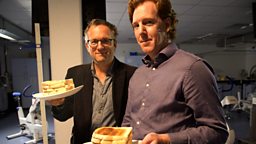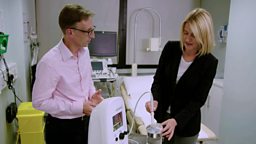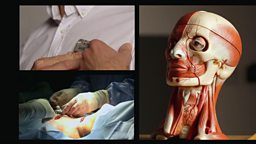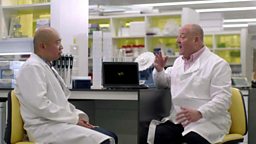Should I get my DNA tested?
There are many commercially available DNA tests on the market, which analyse your genes and then offer advice on health matters – from what you should eat, to your risks of developing certain genetic diseases.

Geneticists widely agree that there are two important limitations to any form of genetic testing: first, most genetic conditions are not caused by changes in a single gene, but by a combination of several changes, across more than one gene. Secondly, the environment has a huge influence on the effect of genes.
Given these constraints, are the testing kits you can buy really able to tell you anything useful?
To explore this question, Michael interviewed two experts with differing views.
First, Craig Pickering, a sports scientist at one of the UK’s biggest companies that sells home testing kits online.
He believes they can be a powerful tool for improving health.
When it comes to characteristics determined by a single gene, such as lactose intolerance, he is confident that the specific version of the gene they can detect with their kits will tell you reliably whether you can or cannot digest lactose.
Every genetic test that his organisation markets is put through a rigorous scientific process, requiring a minimum of three large cohort studies carried out in humans, with a clear consensus on their effect. He admits that the impact of any gene they test for will differ from situation to situation, depending on the individual person’s context.
He wishes genetic testing were more freely available through GPs. He believes this would substantially relieve the burden on the NHS by providing information to patients that might encourage them to implement healthier lifestyle changes before becoming ill.
Michael also interviewed Professor Frances Flinter a clinical geneticist at Guy’s and St Thomas’ Hospital. She is highly sceptical of the benefits of consumer genetic testing kits.
She believes most of the advice provided by these kits, such as improving diet, is already widely known and therefore of limited use.
She takes no issue with the technical reliability of the better quality kits, as in general, the sequencing of DNA is accurate. However, she feels that because the commercial companies tend to only look at certain parts of a person’s DNA, they will miss significant mutations elsewhere, simply because they’re not testing for them.
In addition, these kits may reveal genetic information that a person may regret knowing once they have found out. This includes results that have implications for other members of a person’s family, which they might not have considered before having the test done.
Overall, she would discourage the use of these tests because she believes the chance of them providing any useful information is very small. If an individual is seeking an answer to a serious genetic question, they would be better off going to their GP and having a referral to see a geneticist.





























